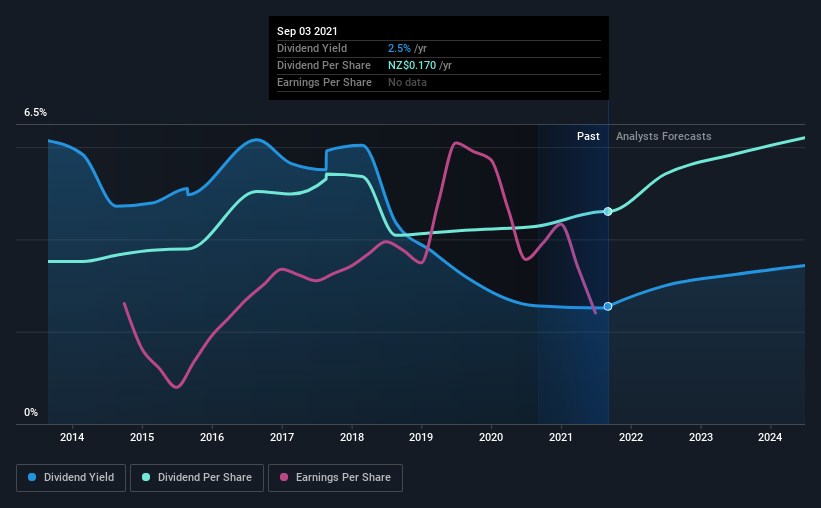Mercury NZ (NZSE:MCY) Is Increasing Its Dividend To NZ$0.12
Mercury NZ Limited (NZSE:MCY) will increase its dividend on the 30th of September to NZ$0.12. The announced payment will take the dividend yield to 3.0%, which is in line with the average for the industry.
See our latest analysis for Mercury NZ
Mercury NZ Doesn't Earn Enough To Cover Its Payments
While it is always good to see a solid dividend yield, we should also consider whether the payment is feasible. Before making this announcement, the company's dividend was much higher than its earnings. Without profits and cash flows increasing, it would be difficult for the company to continue paying the dividend at this level.
Over the next year, EPS is forecast to expand by 18.4%. However, if the dividend continues growing along recent trends, it could start putting pressure on the balance sheet with the payout ratio reaching 168% over the next year.
Mercury NZ's Dividend Has Lacked Consistency
It's comforting to see that Mercury NZ has been paying a dividend for a number of years now, however it has been cut at least once in that time. This suggests that the dividend might not be the most reliable. Since 2013, the first annual payment was NZ$0.13, compared to the most recent full-year payment of NZ$0.17. This implies that the company grew its distributions at a yearly rate of about 3.4% over that duration. The dividend has seen some fluctuations in the past, so even though the dividend was raised this year, we should remember that it has been cut in the past.
Mercury NZ May Find It Hard To Grow The Dividend
Given that the dividend has been cut in the past, we need to check if earnings are growing and if that might lead to stronger dividends in the future. It's not great to see that Mercury NZ's earnings per share has fallen at approximately 2.3% per year over the past five years. Declining earnings will inevitably lead to the company paying a lower dividend in line with lower profits. Earnings are forecast to grow over the next 12 months and if that happens we could still be a little bit cautious until it becomes a pattern.
We're Not Big Fans Of Mercury NZ's Dividend
Overall, while the dividend being raised can be good, there are some concerns about its long term sustainability. The company's earnings aren't high enough to be making such big distributions, and it isn't backed up by strong growth or consistency either. Overall, this doesn't get us very excited from an income standpoint.
Market movements attest to how highly valued a consistent dividend policy is compared to one which is more unpredictable. Meanwhile, despite the importance of dividend payments, they are not the only factors our readers should know when assessing a company. Case in point: We've spotted 2 warning signs for Mercury NZ (of which 1 can't be ignored!) you should know about. Looking for more high-yielding dividend ideas? Try our curated list of strong dividend payers.
This article by Simply Wall St is general in nature. We provide commentary based on historical data and analyst forecasts only using an unbiased methodology and our articles are not intended to be financial advice. It does not constitute a recommendation to buy or sell any stock, and does not take account of your objectives, or your financial situation. We aim to bring you long-term focused analysis driven by fundamental data. Note that our analysis may not factor in the latest price-sensitive company announcements or qualitative material. Simply Wall St has no position in any stocks mentioned.
Have feedback on this article? Concerned about the content? Get in touch with us directly. Alternatively, email editorial-team (at) simplywallst.com.

 Yahoo Finance
Yahoo Finance 
